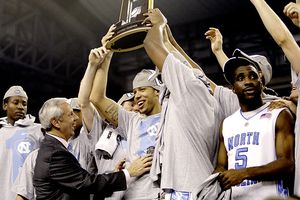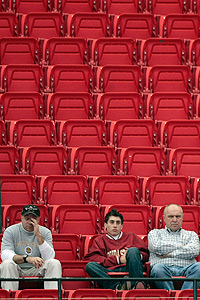So the NCAA wants to expand March Madness but can't do a playoff for Division 1 football? I really do hope they don't do this expansion, after awhile it is too much.Yes, of course, we should absolutely expand the NCAA men's basketball tournament to 96 teams. And while we're at it, let's rework the opening of Clapton's "Layla," tell Penelope Cruz she needs a nip and tuck, and replace all the azaleas and pines at Augusta National with strip-club signage.Some things are perfect just the way they are. Or near-perfect. The NCAA tournament is one of those things.Not so perfect are the NCAA power brokers who are pushing hard (and a bit too stealthily) for tournament expansion, from 65 teams to as many as 96. This makes as much sense as other landmark NCAA decisions, such as players not getting a single dime from the $6 billion tournament ATM.As always, follow the money. Because if the power brokers get their way, this will have everything to do with dollar signs and nothing to do with the aesthetics and symmetry of the tournament. If it were about the tournament itself, March Madness would already have been declared a national landmark and protected from hack-job overhauls.But the NCAA, which has a long history of making really dumb decisions, is thinking about wholesale renovation. It wants a teardown when all the tournament really needs is a little more closet space.[+] EnlargeAP Photo/Eric GayAn expanded tournament would dilute the achievements of national champions such as North Carolina last year.I don't get it. What's not to love about the current version of the tournament?It lasts the perfect length of time (three weeks), with the perfect pacing (regional games on Thursday and Saturday, or Friday and Sunday), with the perfect three-day pause between Selection Sunday and the full beginning of the first round, and another three-day gap between the Sweet 16 and the fistfight to reach the Final Four.It features prominent versus unknown, big versus small, urban versus rural.It gives any team with an actual chance to win the national championship … well, an actual chance.Expanding to 96 teams would be like aiming a fire hose at a glass of Dom Perignon. It would dilute it beyond recognition. It would ruin it.The NCAA tournament needs another 31 teams like D.C. needs more snow right now. If the point is to make the tournament better, adding borderline programs to the Madness accomplishes nothing. An elegant, compelling three-week miniseries suddenly becomes bloated, contrived and artificial.If it were up to me, and not the chancellors and university presidents on the Division I board of directors, I'd tweak rather than demolish. I'd get rid of the ridiculously demeaning single play-in game and instead add the next three most deserving teams on the selection committee's tournament bubble. Expand to 68 teams and draw a line in the hardwood floor. No more.[+] EnlargeAP Photo/Tom StrattmanMike Slive, chairman of the 2009 selection committee, was grilled in a teleconference about last year's pairings. Isn't it hard enough to figure out a 65-team bracket?Look, there's a reason God invented the National Invitation Tournament. The NIT is for teams that belong in the Little Dance, not the Big Dance. Increasing the field to 96 teams would create a shotgun wedding between NIT-quality teams and NCAA tournament-quality programs.You think some iffy teams get in these days? Wait until you see what kind of basketball sludge would make it into a 96-team format. We're talking power conference teams with, what, 6-12 conference records? We're talking teams with cotton ball-soft strength of schedules. We're talking about Timex passing for Rolex.The opening round would be a disaster area of "Who's That?" versus "What's Their Names?" The top 32 teams would get a bye, so you'd get a thrilling No. 33 versus No. 96 opening-week matchup. That's not drama; that's the Sun Belt Conference tournament semis.Half of the fun of the NCAAs is figuring out who gets in and who gets left out. Expand to 96 and Bracketology becomes a minor, not a major. Joe Lunardi will be on the streets.Exclusion isn't always a bad thing. It creates drama. It gives the long regular season more meaning. There's something at stake.A field of 96 creates Zzzzzzzzzzzzs. It reduces the regular season to a seeding contest. Plus, do we really think the 96th team in the field has any realistic chance of winning more than one game? After all, no No. 16 seed has ever beaten a No. 1 seed.The possibility of expansion didn't happen by accident. It happened because the NCAA can opt out of the final three years of its 11-year deal with CBS. A summer deadline looms.AP Photo/Dave MartinThis is about how many people might show up for a first-round game between the 96th seed and the No. 1 team.So there are two moving parts in the debate. There's the issue of format: Does it makes sense to expand from 65 to 96? And then there's the real issue: Does it make dollars and cents to expand from 65 to 96?No.No.Coaches generally love expansion because it gives them an easier path to the tournament. The more tournament appearances, the more job security.And sure, more players would get a chance to extend their seasons. For one or two games, tops.But from a practical standpoint, the present format is nearly flawless. So leave it alone. At the very least, don't use a jackhammer when a small chisel will do.As for the financial side of it, someone at the NCAA needs to take a business course or call Warren Buffett. Since when do you offer one-of-a-kind basketball oceanfront property on the cheap?Always sell high, not low. That's what the NFL does. It understands the value of its product, waits until the economic timing is right and then opens the bidding.Meanwhile, the NCAA is considering an opt-out during the middle of a recession. How shrewd.I say leave near-perfection -- and our 64-team office-pool brackets -- alone. For once, follow the logic, not the money.
Monday, February 15, 2010
Increasing the March Madness Field is a Bad Idea
So I guess the most recent talk has been to increase the March Madness field to 96 teams. My first question to that is why? What is wrong with the way it is currently? 96 teams to me seems to be so much and really how do you determine who the next 32 teams should be? Should teams with losing records be allowed into the field since they play a tough schedule? Gene Wojciechowski I think best sums it up in his article on the matter on why the current field of 65 is just right.
Subscribe to:
Post Comments (Atom)














No comments:
Post a Comment